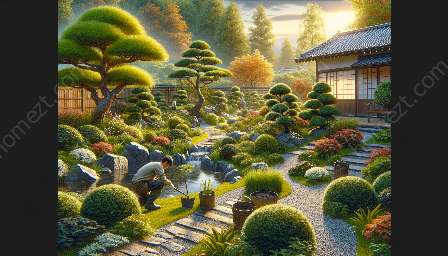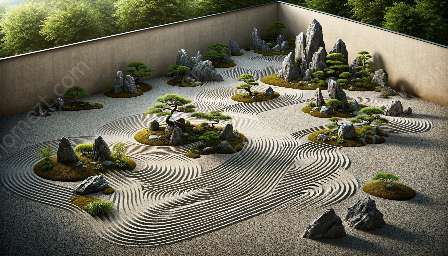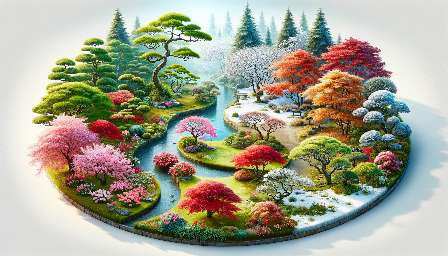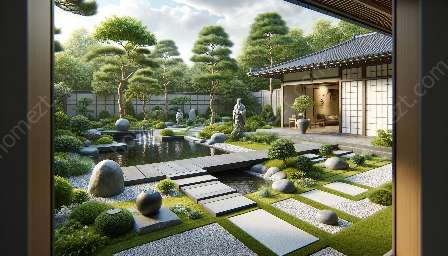Japanese gardens are a harmonious blend of nature, spirituality, and art, reflecting the profound connection between Zen philosophy and landscape design. Cultivated over centuries, these serene sanctuaries embody the principles of gardening and landscaping, emphasizing simplicity, tranquility, and harmony with the natural world. Let's delve into the captivating world of Japanese gardens and explore the art of Zen through their timeless beauty and wisdom.
The Origins of Japanese Gardens
Japanese gardens, often referred to as 'Nihon Teien' in Japanese, have a rich history steeped in ancient traditions and philosophical influences. Among these, the teachings of Zen Buddhism have had a profound impact, shaping the fundamental principles that define Japanese garden design.
Zen Philosophy: Understanding the Essence
Zen philosophy, derived from the teachings of Buddhism, emphasizes the significance of mindfulness, simplicity, and interconnectedness with nature. At the core of Zen is the pursuit of enlightenment and the cultivation of inner peace through meditation and self-reflection. These principles are intricately woven into the fabric of Japanese gardens, guiding every aspect of their creation and maintenance.
Minimalism and Simplicity
The essence of Zen philosophy is epitomized by minimalism and simplicity, and these qualities are vividly expressed in the design of Japanese gardens. Every element within a typical Japanese garden, from the carefully placed rocks and meticulously raked gravel to the pruned trees and tranquil ponds, reflects a sense of understated elegance and tranquility. By embodying simplicity, Japanese gardens invite visitors to contemplate the beauty of impermanence and appreciate the present moment.
Harmony with Nature
Central to both Zen philosophy and Japanese gardens is the harmonious integration of human artistry with the natural environment. In Japanese garden design, the careful selection and placement of plants, stones, and water features evoke a sense of reverence for the surrounding landscape, fostering a profound connection between visitors and the serene beauty of nature. This emphasis on harmony with nature echoes the Zen principle of embracing life's imperfections and finding beauty in the natural world.
The Art of Landscaping in Japanese Gardens
Japanese garden design transcends mere aesthetics, embodying a holistic approach to landscaping that reflects the principles of Zen philosophy. The meticulous arrangement of elements within these landscapes serves as a testament to the timeless artistry and profound wisdom inherent in Japanese gardens.
Symbolism and Meaning
Japanese gardens are adorned with symbolic representations of natural elements, each carefully selected to convey profound meanings and evoke contemplation. From the carefully pruned pine trees symbolizing longevity and resilience to the serene water features symbolizing purity and tranquility, every aspect of a Japanese garden tells a story, inviting visitors to immerse themselves in the profound symbolism and ancient wisdom.
Simplicity in Form and Function
The formal design principles of Japanese gardens reflect a dedication to simplicity in form and function. Every element, whether it be a carefully placed lantern or a meticulously raked gravel pattern, serves a purpose that goes beyond mere ornamentation. This deliberate approach to design, rooted in Zen philosophy, encourages a mindful appreciation of the interconnectedness of all elements within the garden, fostering a sense of inner peace and serenity.
Rhythms of Nature
Japanese gardens are meticulously crafted to evoke the rhythms of nature, embodying the Zen principle of attunement to the natural world. Through the use of carefully positioned rocks, meandering pathways, and gentle cascades, these landscapes mimic the organic flow of rivers and mountains, inviting visitors to experience the gentle cadence of nature's harmonious movements.
Fostering Tranquility and Serenity
At the heart of Japanese gardens lies a profound commitment to fostering tranquility and serenity, drawing inspiration from the meditative practices of Zen philosophy. These sanctuaries of harmony and balance are meticulously designed to create a sense of inner peace, inviting visitors to embark on a contemplative journey amid the serene beauty of nature.
Meditative Spaces
Japanese gardens provide serene spaces for meditation and introspection, serving as sanctuaries for quiet contemplation and spiritual rejuvenation. Whether it's the peaceful tranquility of a Zen rock garden or the serene ambiance of a koi pond, every feature within a Japanese garden is crafted to evoke a sense of mindfulness and tranquility, offering visitors an opportunity to immerse themselves in the present moment.
Seasonal Transformations
The changing seasons play a pivotal role in Japanese garden design, reflecting the impermanence and transience central to Zen philosophy. As the garden evolves with each season, from the vibrant blossoms of spring to the serene tranquility of winter, visitors are reminded of the ever-changing nature of existence, aligning with the Zen principle of embracing impermanence and finding beauty in the ebb and flow of life.
Embracing Stillness
Amid the serene landscapes of Japanese gardens, visitors can embrace moments of stillness and quiet reflection, in harmony with the Zen ideal of attaining inner peace. The deliberate placement of stones, the gentle rustling of bamboo, and the soothing sounds of water lend a sense of timelessness and serenity, creating an environment conducive to mindfulness and contemplation.
Capturing the Essence of Zen in Japanese Gardens
Japanese gardens encapsulate the essence of Zen philosophy, serving as living artworks that embody the timeless wisdom of harmony, tranquility, and mindfulness. By exploring the intricate interplay between Zen philosophy and landscape design, we gain a deeper appreciation for Japanese gardens as profound expressions of cultural heritage and spiritual enlightenment.
Honoring Tradition and Innovation
Japanese gardens continue to evolve, honoring traditional design principles while embracing innovative approaches that resonate with contemporary sensibilities. This delicate balance between tradition and innovation reflects the adaptability and resilience embodied in Zen philosophy, ensuring that Japanese gardens remain timeless sanctuaries that inspire awe and introspection for generations to come.
Celebrating Simplicity and Beauty
At the heart of Japanese gardens is the celebration of simplicity and beauty, echoing the core tenets of Zen philosophy. These resplendent landscapes invite exploration and contemplation, offering a glimpse into the profound connection between humanity and nature, while beckoning visitors to discover moments of tranquility and serenity amid the ever-changing tapestry of life.





















